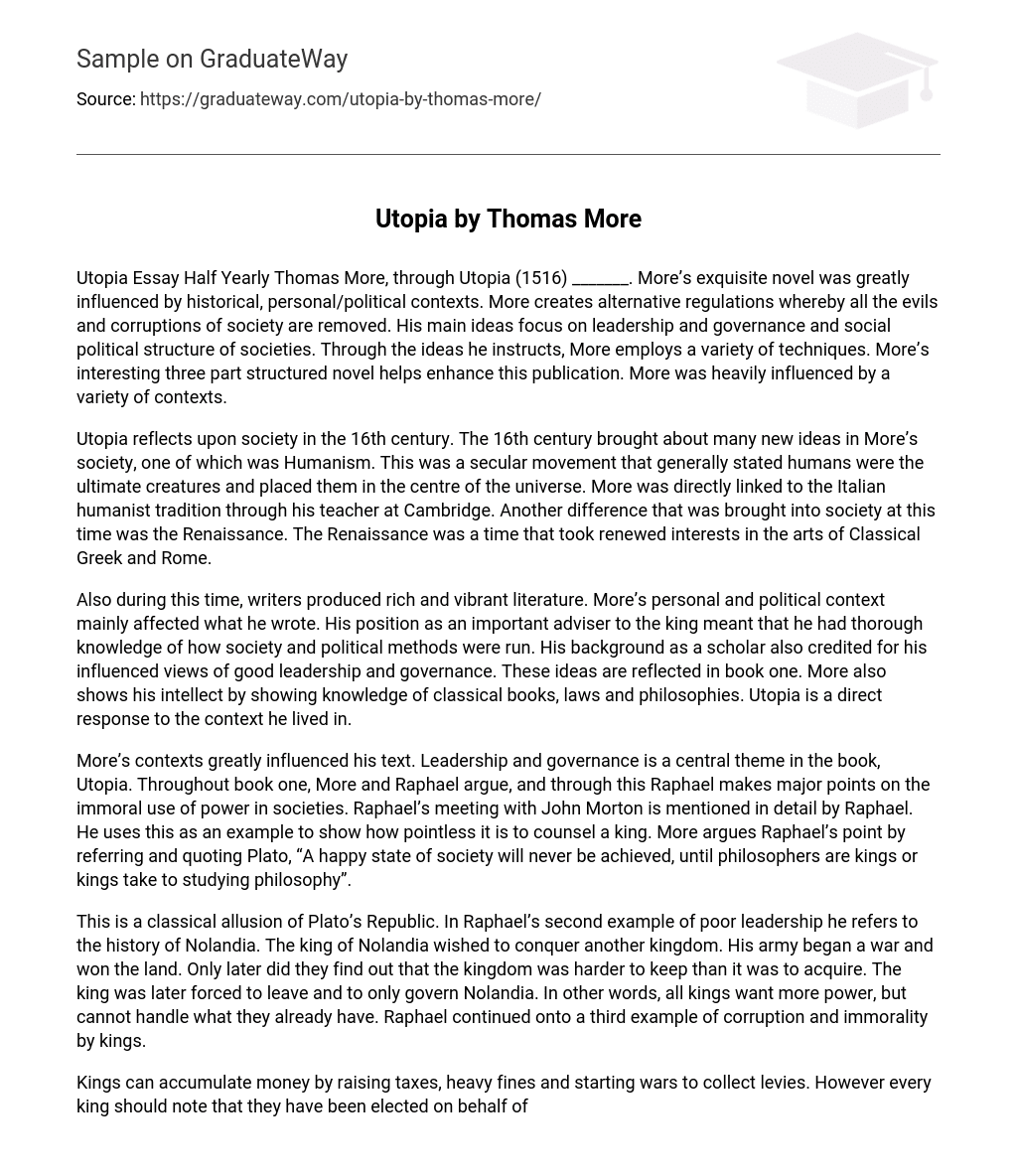More’s exquisite novel was greatly influenced by historical, personal/political contexts. More creates alternative regulations whereby all the evils and corruptions of society are removed. His main ideas focus on leadership and governance and social political structure of societies. Through the ideas he instructs, More employs a variety of techniques. More’s interesting three part structured novel helps enhance this publication. More was heavily influenced by a variety of contexts.
Utopia reflects upon society in the 16th century. The 16th century brought about many new ideas in More’s society, one of which was Humanism. This was a secular movement that generally stated humans were the ultimate creatures and placed them in the centre of the universe. More was directly linked to the Italian humanist tradition through his teacher at Cambridge. Another difference that was brought into society at this time was the Renaissance. The Renaissance was a time that took renewed interests in the arts of Classical Greek and Rome.
Also during this time, writers produced rich and vibrant literature. More’s personal and political context mainly affected what he wrote. His position as an important adviser to the king meant that he had thorough knowledge of how society and political methods were run. His background as a scholar also credited for his influenced views of good leadership and governance. These ideas are reflected in book one. More also shows his intellect by showing knowledge of classical books, laws and philosophies. Utopia is a direct response to the context he lived in.
More’s contexts greatly influenced his text. Leadership and governance is a central theme in the book, Utopia. Throughout book one, More and Raphael argue, and through this Raphael makes major points on the immoral use of power in societies. Raphael’s meeting with John Morton is mentioned in detail by Raphael. He uses this as an example to show how pointless it is to counsel a king. More argues Raphael’s point by referring and quoting Plato, “A happy state of society will never be achieved, until philosophers are kings or kings take to studying philosophy”.
This is a classical allusion of Plato’s Republic. In Raphael’s second example of poor leadership he refers to the history of Nolandia. The king of Nolandia wished to conquer another kingdom. His army began a war and won the land. Only later did they find out that the kingdom was harder to keep than it was to acquire. The king was later forced to leave and to only govern Nolandia. In other words, all kings want more power, but cannot handle what they already have. Raphael continued onto a third example of corruption and immorality by kings.
Kings can accumulate money by raising taxes, heavy fines and starting wars to collect levies. However every king should note that they have been elected on behalf of the society and it is his duty to the people and not for himself. Raphael uses a sacred country as an example. In Happiland, kings must swear oaths, that they will never hold more than 1000 pounds in treasury. With this example Raphael compares modern society. Kings or people will never change their ways and will always remain dishonest, “The success of a king doesn’t come by how much money he has, but how much the kingdom has” (Plato’s Republic).
Throughout book one More is credited for his use of two different voices through the same person (More & Hythloday). Throughout Book two, More focuses on comparing social and political structures of societies. Through Utopia he states that many problems and corruptions lie in society. More describes an alternate society and culture in which all social ills have been cured. The distribution of wealth is always in equilibrium in Utopia. This benefit prevents many issues such as robbery, criminals and beggars. More also consolidates the issue of private property in Utopia.
He simply wanted to, “stop the rich from cornering markets and establishing virtual monopolies”. Agriculture is also dealt with within Utopia. They grow their own food and farming is compulsory by each citizen at a point in their life. This ideology makes food cheaper and no trade problems are encountered. Also high amounts of exports would be demanded due to the large amount of resources. Other issues such as racism and sexism were also resolved. Each individual was equal. More uses a traditional three part structure to further enhance the layout of his ideas.
The letters at the beginning of the novel raise questions about the reality or the verisimilitude of Utopia. During Book one, More, Gilles and Hythloday discuss the state of the world and in particular the state of England. The second part is devoted to a full description of Utopia. Throughout the novel More uses paradoxes in regard to his naming of places and characters. Utopia, can mean both “no place” and “good place”. The name of his protagonist, Raphael Hythloday roughly translates to: “the speaker of nonsense”.
The name of the river in Utopia’s capital, Aircastle is “No water”. These paradoxes show that although More thought this to be his ideal society, he knew that there would never be a place that could accurately replicate his Utopia. Thomas More’s Utopia is an exquisite text. More was heavily influenced by his context of historical and political. He explores the ways leadership and governance is abused. More reveals the flaws in his own society and creates an imaginary place (utopia) as an alternative to this.





